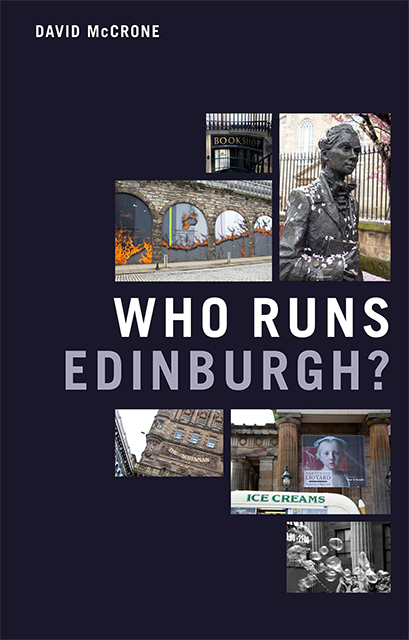Book contents
- Frontmatter
- List of Contents
- Figures and Tables
- Preface
- 1 Who Runs Edinburgh?
- 2 Politics in Edinburgh
- 3 Winners and Losers: The Political Economy of Edinburgh
- 4 Treading Angels: Edinburgh and its Festivals
- 5 Are You One of Us? Status in the City
- 6 What School did You Go To? Education and Status in Edinburgh
- 7 Enlightened City: Cultural Power and University Life
- 8 Developing Edinburgh: Pies in the Sky, Holes in the Ground
- 9 Lost in Leith: Accounting for Edinburgh’s Trams
- 10 Does Anyone Really Run Edinburgh?
- Bibliography
- Index
1 - Who Runs Edinburgh?
Published online by Cambridge University Press: 25 October 2023
- Frontmatter
- List of Contents
- Figures and Tables
- Preface
- 1 Who Runs Edinburgh?
- 2 Politics in Edinburgh
- 3 Winners and Losers: The Political Economy of Edinburgh
- 4 Treading Angels: Edinburgh and its Festivals
- 5 Are You One of Us? Status in the City
- 6 What School did You Go To? Education and Status in Edinburgh
- 7 Enlightened City: Cultural Power and University Life
- 8 Developing Edinburgh: Pies in the Sky, Holes in the Ground
- 9 Lost in Leith: Accounting for Edinburgh’s Trams
- 10 Does Anyone Really Run Edinburgh?
- Bibliography
- Index
Summary
Why study any city or ‘place’ these days? The conventional argument is that power has moved away from localities, first, to reside at the level of the state, and then at the global level. There seems little point in focusing on localities, even ones as putatively interesting as Edinburgh, a historic capital city, historic in both senses: once the capital of an independent state, as well as a city full of old buildings, and one with an international reputation for culture reflected, above all, in its festival(s).
There is another intriguing reason for studying Edinburgh. It is a capital city, albeit one which is ‘historic’ (formally ending in 1707). That may seem obvious, but it introduces another level of tension: between the local and the national. Simply put, to what extent is the city operating to serve its citizens and hinterland, and to what extent fulfilling its role as a national capital? This matters, because while not the capital of an independent state, there are civil institutions to be housed and serviced: of law, courts, professions, social and political order and civil regulation. The fact that there is a parliament in Edinburgh since 1999 makes the point: that is both a national as well as a local institution. Furthermore, Edinburgh is a small city, of half a million people, small in proportional terms –less than 10 per cent of Scotland's population –compared with the likes of London, Paris or even Dublin, which has about a quarter of Ireland’s. Accommodating national agencies is, arguably, a challenge for a small city; think of Bonn in West Germany before reunification, or Ottawa in Canada, dwarfed alongside Toronto and Montreal. While Edinburgh receives national financial support for its duties as a capital city, there are tensions, most notably over tourist footfall. Such tensions, like points of conflict, are analytically interesting because they help to make explicit various systems of power and influence. The more contested they are, the easier it is to see power in action.
STUDYING POWER
We might well ask: who does power studies these days? That tradition of studying local elites, notably in the US in the 1950s and 1960s (associated with Robert Dahl, Nelson Polsby, Floyd Hunter), ended long ago.
- Type
- Chapter
- Information
- Who Runs Edinburgh? , pp. 1 - 23Publisher: Edinburgh University PressPrint publication year: 2022



